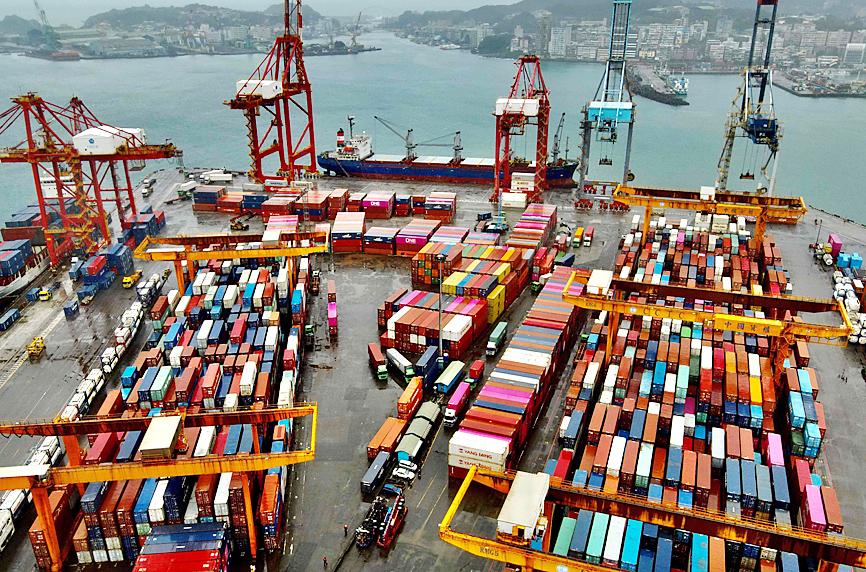The government’s business climate monitor last month signaled “green” for the fourth straight month as the nation’s economic recovery held firm, thanks to robust demand for both tech and non-tech products, the National Development Council said yesterday.
The gauge gained two points to 30, the highest in nine-and-a-half years, and was set to climb higher this month, the council said.
“The latest data suggest that the recovery is not only stable, but will gain further traction,” council research director Wu Ming-huei (吳明蕙) told a media briefing in Taipei.

Photo: Sam Yeh, AFP
The council uses a five-color system to portray the nation’s economic state, with “green” indicating steady growth, “red” suggesting overheating and “blue” signaling a recession. Dual colors mean it is in transition.
The gauge is only two points away from the boom values of 32 to 37, aided by better manufacturing, restaurant and retail sales, the council said.
The remaining constituents stayed in a healthy zone.
Wu said that the monitor might signal “yellow-red” this month, as there is cause for pessimism, based on the trends of all economic bellwethers.
Demand for 5G wireless communication and new technology applications remained strong, while non-tech products showed signs of rebounding, explaining why most sectors reported an upturn in business, Wu said.
The annual “Singles’ Day” shopping season that culminated on Nov. 11 helped boost retail sales in Taiwan, she said.
The index of leading indicators, which aims to forecast the economic situation for the next six months, increased 1.41 percent to 107.45, as all sub-indices registered positive cyclical movements, the report said.
That suggests that recovery is broad-based, rather than being limited to tech sectors as previously, Wu said.
The index of coincident indicators, which reflects the current economic state, gained 1.16 percent to 104.21, also drawing support from all sub-indices, the report showed.
Despite the improvement, the COVID-19 pandemic would continue to pose uncertainty for the global economy next year, Wu said.
If the pandemic escalates in Europe and the US, Taiwan cannot stay immune given its heavy dependence on exports, she added.
Separately yesterday, the council set its economic growth target for Taiwan next year at 3.8 percent to 4.2 percent, driven mainly by growth in external demand, private consumption and domestic investment.
The high end of the council’s growth target is just more than the 3.83 percent the Directorate-General of Budget, Accounting and Statistics forecast on Nov. 27.
The council also expects the nation’s GDP per capita next year to be between US$30,038 and US$30,145, the consumer price index to rise by 1 to 1.5 percent and the unemployment rate to be 3.6 to 3.8 percent, according to a statement on its Web site.

Shares in Taiwan closed at a new high yesterday, the first trading day of the new year, as contract chipmaker Taiwan Semiconductor Manufacturing Co (TSMC, 台積電) continued to break records amid an artificial intelligence (AI) boom, dealers said. The TAIEX closed up 386.21 points, or 1.33 percent, at 29,349.81, with turnover totaling NT$648.844 billion (US$20.65 billion). “Judging from a stronger Taiwan dollar against the US dollar, I think foreign institutional investors returned from the holidays and brought funds into the local market,” Concord Securities Co (康和證券) analyst Kerry Huang (黃志祺) said. “Foreign investors just rebuilt their positions with TSMC as their top target,

REVENUE PERFORMANCE: Cloud and network products, and electronic components saw strong increases, while smart consumer electronics and computing products fell Hon Hai Precision Industry Co (鴻海精密) yesterday posted 26.51 percent quarterly growth in revenue for last quarter to NT$2.6 trillion (US$82.44 billion), the strongest on record for the period and above expectations, but the company forecast a slight revenue dip this quarter due to seasonal factors. On an annual basis, revenue last quarter grew 22.07 percent, the company said. Analysts on average estimated about NT$2.4 trillion increase. Hon Hai, which assembles servers for Nvidia Corp and iPhones for Apple Inc, is expanding its capacity in the US, adding artificial intelligence (AI) server production in Wisconsin and Texas, where it operates established campuses. This

H200 CHIPS: A source said that Nvidia has asked the Taiwanese company to begin production of additional chips and work is expected to start in the second quarter Nvidia Corp is scrambling to meet demand for its H200 artificial intelligence (AI) chips from Chinese technology companies and has approached contract manufacturer Taiwan Semiconductor Manufacturing Co (TSMC, 台積電) to ramp up production, sources said. Chinese technology companies have placed orders for more than 2 million H200 chips for this year, while Nvidia holds just 700,000 units in stock, two of the people said. The exact additional volume Nvidia intends to order from TSMC remains unclear, they said. A third source said that Nvidia has asked TSMC to begin production of the additional chips and work is expected to start in the second

Garment maker Makalot Industrial Co (聚陽) yesterday reported lower-than-expected fourth-quarter revenue of NT$7.93 billion (US$251.44 million), down 9.48 percent from NT$8.76 billion a year earlier. On a quarterly basis, revenue fell 10.83 percent from NT$8.89 billion, company data showed. The figure was also lower than market expectations of NT$8.05 billion, according to data compiled by Yuanta Securities Investment and Consulting Co (元大投顧), which had projected NT$8.22 billion. Makalot’s revenue this quarter would likely increase by a mid-teens percentage as the industry is entering its high season, Yuanta said. Overall, Makalot’s revenue last year totaled NT$34.43 billion, down 3.08 percent from its record NT$35.52